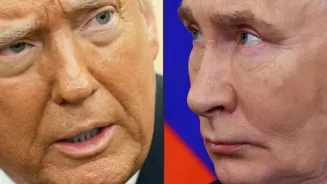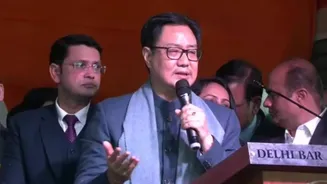In a major retaliatory move to Donald Trump’s decision to deploy nuclear submarines near Russia, Moscow announced its departure from the Cold War-era agreement between the United States and the Soviet
Union, known as the 1987 Intermediate-Range Nuclear Forces (INF) Treaty.
The treaty was signed in 1987 by Soviet leader Mikhail Gorbachev and US President Ronald Reagan, aiming to eliminate an entire class of weapons – ground-launched nuclear missiles with a range of 500 to 5,500km. This put a ban on installing short- and medium-range nuclear missiles that reduced the threat of nuclear war in Europe.
The US withdrew from the treaty in 2019 during Donald Trump’s first term, citing Russian violations. However, Moscow had then said that it would not deploy such weapons, given that Washington also did not do it.
After the US’ withdrawal from the INF Treaty, Russia had announced a unilateral (self-imposed moratorium), which meant it chose not to deploy such missiles until the US did.
However, Russia has also pulled out of the treaty after Trump said that he had ordered the deployment of two US Navy nuclear submarines in “appropriate regions” near Russia, in response to former Russian President Dmitry Medvedev’s “highly provocative” comments.
What Did Russian Foreign Ministry Say?
In a statement, Russian Foreign Ministry said that the developing situation in Europe and Asia Pacific has led Moscow to reassess the deployment of short- and medium-range missiles.
“Since the situation is developing towards the actual deployment of US-made land-based medium- and short-range missiles in Europe and the Asia-Pacific region, the Russian Foreign Ministry notes that the conditions for maintaining a unilateral moratorium on the deployment of similar weapons have disappeared,” the ministry said, Al Jazeera reported.
Soon after this, former Russian President Dmitry Medvedev blamed NATO’s “anti-Russian policy” for Moscow’s pull out and warned that the country will take “further steps” in response.
“The Russian Foreign Ministry’s statement on the withdrawal of the moratorium on the deployment of medium- and short-range missiles is the result of NATO countries’ anti-Russian policy. This is a new reality all our opponents will have to reckon with. Expect further steps,” he tweeted.
The Russian Foreign Ministry’s statement on the withdrawal of the moratorium on the deployment of medium- and short-range missiles is the result of NATO countries’ anti-Russian policy.
This is a new reality all our opponents will have to reckon with. Expect further steps.— Dmitry Medvedev (@MedvedevRussiaE) August 4, 2025
Medvedev, who is currently serving as the deputy head of Russia’s powerful Security Council, however, did not elaborate on what “further steps” his country may take.
Last week, Trump had ordered two nuclear submarines to be positioned in the “appropriate regions”, after Medvedev’s remarks about the risk of war between Washington and Moscow.
What Had Russia Said On US’ Withdrawal?
Russian President Vladimir Putin and Foreign Minister Sergey Lavrov had said that Moscow may have to respond to the US and NATO “provocations” by lifting restrictions on missile deployment, according to Al Jazeera.
Lavrov told Russia’s state news agency RIA Novosti in December that Moscow’s unilateral moratorium was “practically no longer viable and will have to be abandoned”.
“The United States arrogantly ignored warnings from Russia and China and, in practice, moved on to deploying weapons of this class in various regions of the world,” Lavrov had said.














